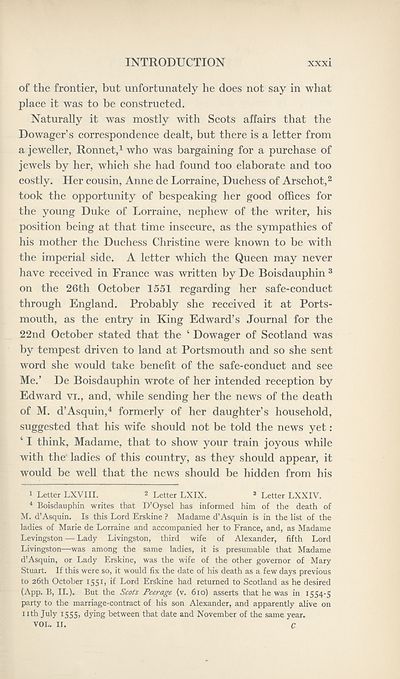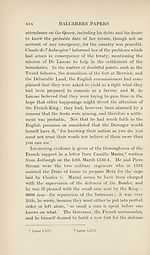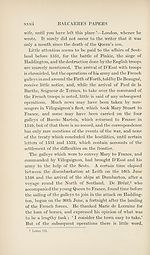Series 3 > Foreign correspondence with Marie de Lorraine, Queen of Scotland, from the originals in the Balcarres papers > Volume 7
(42) Page xxxi
Download files
Complete book:
Individual page:
Thumbnail gallery: Grid view | List view

INTRODUCTION
xxxi
of the frontier, but unfortunately he does not say in what
place it was to be constructed.
Naturally it was mostly with Scots affairs that the
Dowager’s correspondence dealt, but there is a letter from
a jeweller, Ronnet,1 who was bargaining for a purchase of
jewels by her, which she had found too elaborate and too
costly. Her cousin, Anne de Lorraine, Duchess of Arschot,2
took the opportunity of bespeaking her good offices for
the young Duke of Lorraine, nephew of the writer, his
position being at that time insecure, as the sympathies of
his mother the Duchess Christine were known to be with
the imperial side. A letter which the Queen may never
have received in France was written by De Boisdauphin 3
on the 26th October 1551 regarding her safe-conduct
through England. Probably she received it at Ports¬
mouth, as the entry in King Edward’s Journal for the
22nd October stated that the ‘ Dowager of Scotland was
by tempest driven to land at Portsmouth and so she sent
word she would take benefit of the safe-conduct and see
Me.’ De Boisdauphin wrote of her intended reception by
Edward vi., and, while sending her the news of the death
of M. d’Asquin,4 formerly of her daughter’s household,
suggested that his wife should not be told the news yet:
‘ I think, Madame, that to show your train joyous while
with the' ladies of this country, as they should appear, it
would be well that the news should be hidden from his
i Letter LXVIII. 2 Letter LXIX. 3 Letter LXXIV.
4 Boisdauphin writes that D’Oysel has informed him of the death of
M. d’Asquin. Is this Lord Erskine ? Madame d’Asquin is in the list of the
ladies of Marie de Lorraine and accompanied her to France, and, as Madame
Levingston — Lady Livingston, third wife of Alexander, fifth Lord
Livingston—was among the same ladies, it is presumable that Madame
d’Asquin, or Lady Erskine, was the wife of the other governor of Mary
Stuart. If this were so, it would fix the date of his death as a few days previous
to 26th October 1551, if Lord Erskine had returned to Scotland as he desired
(App. B, II.). But the Scots Peerage (v. 610) asserts that he was in 1554-5
party to the marriage-contract of his son Alexander, and apparently alive on
nth July 1555, dying between that date and November of the same year.
VOX.. II. c
xxxi
of the frontier, but unfortunately he does not say in what
place it was to be constructed.
Naturally it was mostly with Scots affairs that the
Dowager’s correspondence dealt, but there is a letter from
a jeweller, Ronnet,1 who was bargaining for a purchase of
jewels by her, which she had found too elaborate and too
costly. Her cousin, Anne de Lorraine, Duchess of Arschot,2
took the opportunity of bespeaking her good offices for
the young Duke of Lorraine, nephew of the writer, his
position being at that time insecure, as the sympathies of
his mother the Duchess Christine were known to be with
the imperial side. A letter which the Queen may never
have received in France was written by De Boisdauphin 3
on the 26th October 1551 regarding her safe-conduct
through England. Probably she received it at Ports¬
mouth, as the entry in King Edward’s Journal for the
22nd October stated that the ‘ Dowager of Scotland was
by tempest driven to land at Portsmouth and so she sent
word she would take benefit of the safe-conduct and see
Me.’ De Boisdauphin wrote of her intended reception by
Edward vi., and, while sending her the news of the death
of M. d’Asquin,4 formerly of her daughter’s household,
suggested that his wife should not be told the news yet:
‘ I think, Madame, that to show your train joyous while
with the' ladies of this country, as they should appear, it
would be well that the news should be hidden from his
i Letter LXVIII. 2 Letter LXIX. 3 Letter LXXIV.
4 Boisdauphin writes that D’Oysel has informed him of the death of
M. d’Asquin. Is this Lord Erskine ? Madame d’Asquin is in the list of the
ladies of Marie de Lorraine and accompanied her to France, and, as Madame
Levingston — Lady Livingston, third wife of Alexander, fifth Lord
Livingston—was among the same ladies, it is presumable that Madame
d’Asquin, or Lady Erskine, was the wife of the other governor of Mary
Stuart. If this were so, it would fix the date of his death as a few days previous
to 26th October 1551, if Lord Erskine had returned to Scotland as he desired
(App. B, II.). But the Scots Peerage (v. 610) asserts that he was in 1554-5
party to the marriage-contract of his son Alexander, and apparently alive on
nth July 1555, dying between that date and November of the same year.
VOX.. II. c
Set display mode to:
![]() Universal Viewer |
Universal Viewer | ![]() Mirador |
Large image | Transcription
Mirador |
Large image | Transcription
Images and transcriptions on this page, including medium image downloads, may be used under the Creative Commons Attribution 4.0 International Licence unless otherwise stated. ![]()
| Scottish History Society volumes > Series 3 > Foreign correspondence with Marie de Lorraine, Queen of Scotland, from the originals in the Balcarres papers > Volume 7 > (42) Page xxxi |
|---|
| Permanent URL | https://digital.nls.uk/127214457 |
|---|
| Shelfmark | SCS.SHS.88 |
|---|---|
| Attribution and copyright: |
|
| Attribution and copyright: |
|
|---|
| Description | Over 180 volumes, published by the Scottish History Society, containing original sources on Scotland's history and people. With a wide range of subjects, the books collectively cover all periods from the 12th to 20th centuries, and reflect changing trends in Scottish history. Sources are accompanied by scholarly interpretation, references and bibliographies. Volumes are usually published annually, and more digitised volumes will be added as they become available. |
|---|


